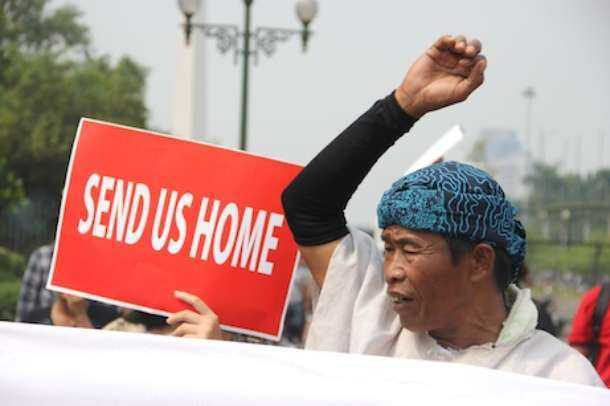
A Shia Muslim joins other activists in protesting outside Indonesia’s presidential palace against attacks by Sunnis in this 2012 file photo. (Photo: Ryan Dagur/UCA News)
Members of a Shia community have declared their conversion to Sunni Islam, the religion of the majority of Indonesian Muslims, in an event facilitated by the Sampang district government and witnessed by ulemas.
This conversion on Nov. 5 came more than eight years after they were forced to live as internally displaced people after their houses were burned down in sectarian mob violence.
Closely guarded by 550 security force personnel, the 273 members of the community read out a statement declaring that Shia was heretical and they were willing to be punished if they continued to worship the Shia way.
Tajul Muluk, the head of the Shia community, claimed that the conversion was of their own free will. "If we continue to be like this [as Shia], life will not be good," he said.
Media reports said that before the event, the Sampang district government had communicated with Muluk several times to prepare for their conversion.
At least 21 of the residents reportedly refused to convert. However, Muluk denied the reports, saying that “we did not force nor were we forced by anyone.”
The Shia communities in Karang Gayam and Blu'uran villages fled their homes during a violent campaign by Sunnis that began in 2006 and culminated in August 2012. Mobs attacked and burned the homes of hundreds of Shia, one person was killed and dozens were injured during the violence.
After the incident, Muluk was jailed for four years on charges of blasphemy.
The Shia residents protested against the persecution, including making a 15-day bicycle journey to Jakarta to publicize their cause in 2013. However, there was no permanent solution.
Their request to convert to Sunnism was in response to a long-standing offer by the government. Former religious affairs minister Suryadharma Ali said after the attack in 2012 that converting to Sunni “was the only way to end the conflict.”
Bonar Tigor Naipospos from the Setara Institute for Democracy and Peace said the decisions made by Muluk and his community were certainly their right. However, he believes they were compelled to make them.
"This is the effect of weakness from the government in fighting for the freedom of religion and belief, which has allowed this to take place," he told UCA News.
“There is a kind of design so that they are conditioned to not be able to choose another path other than following the will of the majority.”
According to Naipospos, enduring years of displacement has caused psychological pressure among the Shias, who are mostly farmers.
He said it was difficult for them to survive in a different social environment, in a different nature, which created enormous psychological tension.
Naipospos said many of them were jobless for a long time. "Therefore, I see leaving the Shia faith as the most rational choice for them so that they can still survive," he said.
Bad precedent
As Islamic minority groups, the Shia and Ahmadiyah are often targeted by Sunnis.
In April, the Tasikmalaya Regency Government in West Java prohibited Ahmadis from conducting religious activities at their Al-Aqsa Mosque.
Meanwhile, in Lombok, West Nusa Tenggara province, after attacks by Sunni Muslims in 2005, hundreds of Ahmadis were evacuated from their village and still live in huts with tiny rooms made of used plywood.
Naipospos said the steps taken by the government in the Shia case in Sampang set a bad precedent.
"I think the same pattern is being applied in the case of the Ahmadis in Lombok, leaving them displaced until they surrender to their situation," he said.
Ahmad Nurcholish of the Indonesia Conference on Religion and Peace said that pressuring residents to give up their faith or die sets a bad precedent, which aggravates the position of other minority communities.
"As Sunnis, we should respect the beliefs of our Shia brothers and sisters. I disagree with the conversion, where only Sunnism is then considered righteous,” he told UCA News.
"I am worried that this will set a bad precedent for the resolution of similar cases."
Usman Hamid, executive director of Amnesty International Indonesia, said the government should be at the forefront of protecting the security and freedom of each of its citizens to embrace a religion according to their beliefs, "not surrendering to intolerant groups and continuing discriminatory practices."
No going home
Muluk said he and the others in the community hope that by becoming Sunnis they can return to their homes and farms. "We were driven out because we were Shia. Now, there should no reason to reject us," he said.
However, they cannot return just yet.
Sampang district chief Slamet Junaidi said that to be able to accept them again, permission still had to come from the ulemas.
"If the ulemas are convinced and accept that Tajul Muluk and his community converted of their own free will, I am sure the problem will be over," he said.


